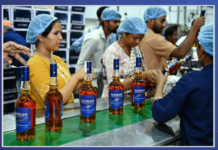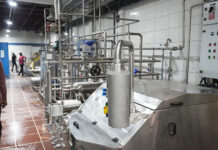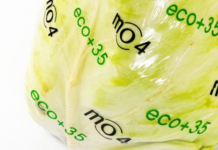Amcor’s premium Matrix paper-based and paraffin-free cheese packaging receive a silver award at the 2020 Packaging Innovation Awards sponsored by Dow. According to Amcor, this innovation provides the right breathable barrier for soft cheese while removing paraffin. It has transformed a non-recyclable packaging material into a cheese wrap that can be recycled in the paper stream.
Amcor, a global leader in packaging, has been awarded a Silver prize at the 2020 Packaging Innovation Awards, sponsored by Dow. The company has been recognized for its Matrix range, its first paper-based, paraffin-free, and recyclable packaging for soft cheese. This innovation provides the right breathable barrier for soft cheese while removing paraffin. It has transformed a non-recyclable packaging material into a cheese wrap that can be recycled in the paper stream.
Michael Zacka, president of Amcor Flexibles EMEA, said, “Matrix’s breakthrough paraffin-free technology brings soft cheese packaging into the circular economy and we are pleased it has been recognized with a prestigious Dow award. Matrix is another move in the right direction for sustainability combined with performance – offering cheese manufacturers improved flavor control and recyclability.”
Soft cheese continues to ripen after it is packaged, and this process needs to be managed through moisture absorption and gas exchange. Over the years, cheese producers have typically used paper packaging with a paraffin (wax) layer. While this offers some advantages, the paraffin can easily transfer to the cheese product, potentially impairing its taste. Using Matrix’s breathable technology, soft cheese producers can control the ripening process, delivering the right taste and texture to consumers throughout the cheese’s shelf life.
The other challenge with traditional paraffin-coated packaging is it makes the paper hard to recycle. Amcor’s Matrix range is a more sustainable option thanks to its independently tested recyclability in the paper stream. Overall, the production and use of Matrix can reduce the packaging’s carbon footprint by 28%.* As a partner in the Ellen MacArthur Foundation’s New Plastics Economy, this innovation supports Amcor’s commitment to developing all its packaging to be recyclable or reusable by 2025.
Additionally, Matrix claims to extend the packaging material’s storage time to 12 months compared to only six months for paraffin-based packaging. This helps cheese producers, which are often small businesses, manage their packaging inventory, and reduce material waste.
“The quality of innovations we saw in the 2020 Packaging Innovation Awards is remarkable,” said Diego Donoso, business president for Dow Packaging and Specialty Plastics. “I am inspired that the packaging industry continues to move sustainability and innovation forward even during complicated times. All winners should be proud of their accomplishment.”
The Packaging Innovation Awards by Dow honors the industry’s top achievements in packaging design, materials, technology, and processes. In 2019, the competition awarded Amcor for its paper-based packaging for processed meat and cheese, PET bottle for Nestlé’s Coffeemate, a Cooler Bag.
*Carbon footprint based on Amcor’s ASSET lifecycle assessment system certified by the Carbon Trust. Comparison based on Matrix cheese wrap Mono-Paper/PE vs. standard cheese wrap OPP/ Paper/ Paraffin Oil. Comparison assumes 80% recycling rate of the Matrix cheese wrap.
IndiFoodBev — authentic, impactful and influential
An English-language food and beverage processing and packaging industry B2B platform in print and web, IndiFoodBev is in its third year of publication. It is said that the Indian food and beverage industries represent approximately US$ 900 billion in revenues which implies more than 20% of the country’s GDP. Eliminating the wastage on the farmside can help to deliver more protein to a higher number of the population apart from generating sizable exports. The savings in soil, seeds, water, fertilizer, energy and ultimately food and nutrition could be the most immense contribution that country is poised to make to the moderation of climate change.
To improve your marketing and grow sales to the food and beverage processing and packaging industry, talk to us. Our research and consulting company IppStar [www.ippstar.org] can assess your potential and addressable markets in light of the competition. We can discuss marketing, communication, and sales strategies for market entry and growth.
Suppliers and service providers with a strategy and budget for targeted marketing can discuss using our hybrid print, web, video, and social media channels to create brand recognition linked to market relevance. Our technical writers are ready to meet you and your customers for content.
The second largest producer of fruit and vegetables in the world is continuously expanding processing capacities and delivery systems with appropriate innovative technologies. We cover product and consumer trends, nutrition, processing, research, equipment and packaging from farm to thali. Get our 2025 media kit and recalibrate your role in this dynamic market. Enhance your visibility and relevance to existing markets and turn potential customers into conversations. Ask for a sample copy of our bi-monthly in print or our weekly IndiFoodBev eZine each Wednesday.
For editorial info@ippgroup.in — for advertisement ads1@ippgroup.in and for subscriptions subscription@ippgroup.in
Naresh Khanna – 10 February 2025
Subscribe Now











